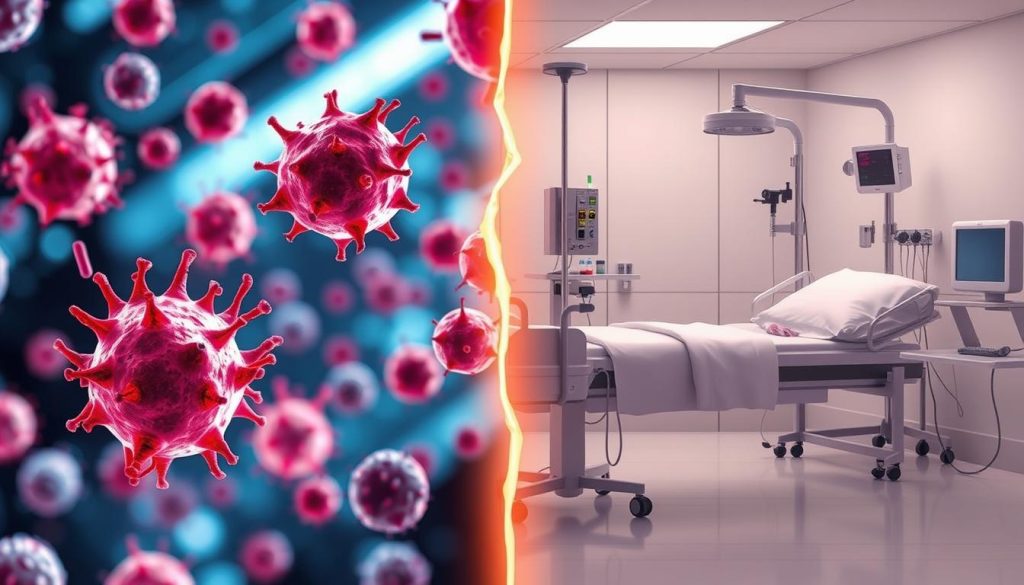Cancer immunotherapy has changed how we treat cancer. CAR T cell therapy is a big step forward. It uses a patient’s immune cells to attack cancer.
By changing T cells to target cancer, CAR T cell therapy has shown great results. It works well for some blood cancers.
The FDA has approved several CAR T cell therapies. This makes the treatment available to more patients. It gives hope to those with blood cancers who have tried other treatments.
As research grows, CAR T cell therapy could help more people. It’s important for patients and families to know how it works. They should also understand what to expect during treatment.
In this guide, we’ll explore CAR T cell therapy’s science. We’ll look at FDA approved treatments and who can get them. We’ll also share what it’s like for patients going through this therapy.
By the end, you’ll know a lot about this new cancer treatment. You’ll see how it’s changing lives for the better.
Introduction to CAR T Cell Therapy
CAR T cell therapy, or chimeric antigen receptor T cell therapy, is a new way to fight cancer. It uses a patient’s own immune system. This method is different from old treatments like chemotherapy, which harm both good and bad cells.
This therapy is a part of adoptive cell transfer. It takes a patient’s T cells, a type of white blood cell, and changes them in a lab. The T cells are then made to find and destroy specific cancer cells.
The idea of CAR T cell therapy started in the 1980s. But it really took off in recent years for blood cancers like leukemia and lymphoma. The FDA has approved some CAR T therapies for these cancers, giving hope to many patients.
“CAR T cell therapy represents a major breakthrough in cancer treatment, providing a targeted and personalized approach that has the power to change how we fight cancer.” – Dr. James Wilson, oncologist
Scientists are now looking to use CAR T therapy for more cancers. They want to target solid tumors and other cancers. CAR T cell therapy is a big step forward in cancer treatment, giving patients a new hope for effective care.
How CAR T Cell Therapy Works
CAR T cell therapy is a groundbreaking gene-modified cell treatment. It uses a patient’s immune system to fight cancer. This method involves changing T cells to find and attack cancer cells.
First, T cells are taken from the patient. Then, they are sent to a lab for genetic engineering. There, they are made to fight cancer by multiplying into millions of cells.
Genetic Engineering of T Cells
Changing T cells is key in CAR T cell therapy. Scientists use viruses to add a CAR gene to the T cells. This gene tells the T cells how to find and attack cancer cells.
“The genetic engineering of T cells is a complex process that requires precision and expertise. It’s like reprogramming the cells to become cancer-fighting machines.” – Dr. Sarah Thompson, Oncologist
Chimeric Antigen Receptors (CARs)
CARs are what make CAR T cells special. They are made from parts of antibodies and T cell receptors. This lets CAR T cells find and attack cancer cells.
Targeting Cancer Cells
After being infused, CAR T cells start to find and kill cancer cells. They do this by using CARs to bind to cancer cell antigens. This process kills cancer cells while keeping healthy cells safe.
This therapy is better than traditional treatments like chemotherapy. It targets cancer cells more precisely. This means fewer side effects and better results for patients.
FDA Approved CAR T Cell Therapies
CAR T cell therapy has changed how we treat some blood cancers. By 2023, the FDA approved five CAR T cell therapies for different blood cancers. These treatments give hope to those who have tried everything else.
Kymriah (tisagenlecleucel)
Kymriah, made by Novartis, was the first CAR T cell therapy approved in August 2017. It helps kids and young adults with B-cell acute lymphoblastic leukemia (ALL) and adults with certain lymphoma. Kymriah attacks B cells with the CD19 antigen.
Yescarta (axicabtagene ciloleucel)
Yescarta, from Kite Pharma (a Gilead company), got FDA approval in October 2017. It’s for adults with relapsed or refractory large B-cell lymphoma. Like Kymriah, Yescarta targets the CD19 antigen on B cells.
Tecartus (brexucabtagene autoleucel)
Tecartus, also from Kite Pharma, was approved in July 2020. It’s for adults with relapsed or refractory mantle cell lymphoma (MCL). Tecartus attacks B cells with the CD19 antigen.
Breyanzi (lisocabtagene maraleucel)
Breyanzi, from Bristol Myers Squibb, was approved in February 2021. It’s for adults with relapsed or refractory large B-cell lymphoma. Breyanzi targets the CD19 antigen on B cells.
Abecma (idecabtagene vicleucel)
Abecma, a joint effort by Bristol Myers Squibb and bluebird bio, was approved in March 2021. It’s for adults with relapsed or refractory multiple myeloma. Unlike others, Abecma targets the BCMA antigen on plasma cells.
| CAR T Cell Therapy | Target Antigen | Indications | FDA Approval |
|---|---|---|---|
| Kymriah | CD19 | ALL, Large B-cell Lymphoma | August 2017 |
| Yescarta | CD19 | Large B-cell Lymphoma | October 2017 |
| Tecartus | CD19 | Mantle Cell Lymphoma | July 2020 |
| Breyanzi | CD19 | Large B-cell Lymphoma | February 2021 |
| Abecma | BCMA | Multiple Myeloma | March 2021 |
These FDA approved CAR T cell therapies have shown great success in trials. They offer a chance for a cure for advanced blood cancers. As research goes on, more uses for these therapies are expected. New CAR T cell products will target more cancer types.
Indications and Eligibility for CAR T Cell Therapy
CAR T cell therapy is a new cancer treatment for some blood cancers. It’s approved by the FDA for certain uses. Patients must meet specific criteria to get this therapy.
The table below shows FDA-approved CAR T cell therapies and their uses:
| CAR T Cell Therapy | Indications |
|---|---|
| Kymriah (tisagenlecleucel) |
|
| Yescarta (axicabtagene ciloleucel) | Relapsed or refractory large B-cell lymphoma in adults |
| Tecartus (brexucabtagene autoleucel) |
|
| Breyanzi (lisocabtagene maraleucel) | Relapsed or refractory large B-cell lymphoma in adults |
| Abecma (idecabtagene vicleucel) | Relapsed or refractory multiple myeloma in adults |
To see if a patient is eligible for car t therapy, doctors look at several things:
- Type and stage of cancer
- Previous treatments and their results
- Overall health and how well the patient can function
- Presence of certain genetic markers or mutations
“CAR T cell therapy offers a personalized approach to cancer treatment, but it’s vital for patients to meet specific eligibility criteria to ensure the best possible outcomes,” explains Dr. Sarah Thompson, a leading oncologist specializing in cellular therapies.
Patients interested in CAR T cell therapy should talk to their oncologist. They can discuss if this treatment is right for them.
The CAR T Cell Therapy Process
CAR T cell therapy is a detailed process with several key steps. It starts with collecting the patient’s T cells and ends with infusing the modified cells back into the patient. Each step is important for the therapy’s success.
T Cell Collection
The first step is collecting T cells from the patient’s blood. This is done using a special machine called a cell separator or apheresis machine. The T cells are then taken to a lab for genetic changes.
Genetic Modification
Next, the T cells are genetically modified. A viral vector is used to add the gene for the chimeric antigen receptor (CAR) to the T cells. This CAR helps the T cells find and attack cancer cells.
Cell Expansion
After modification, the T cells are grown in the lab. This is called cell expansion. It makes sure there are enough CAR T cells to fight the cancer.
Lymphodepletion
Before the CAR T cell infusion, patients get lymphodepletion. This is chemotherapy to lower immune cells. It helps the CAR T cells work better by giving them space to grow.
CAR T Cell Infusion
The last step is the CAR T cell infusion. The modified cells are put back into the patient’s blood. They then find and kill cancer cells. Patients are watched closely after this to manage any side effects.
The whole CAR T cell therapy takes about several weeks. It’s a complex treatment but offers hope for some blood cancer patients who haven’t responded to other treatments.
Potential Side Effects and Risks
CAR T cell therapy has shown great success in treating blood cancers. Yet, it comes with possible side effects and risks. Patients should know about these complications and work with their healthcare team to manage them.
The most common and severe side effects include:
Cytokine Release Syndrome (CRS)
CRS happens when the immune system, boosted by CAR T cells, releases a lot of inflammatory molecules. Symptoms can range from mild flu-like symptoms to severe issues like:
- High fever
- Chills
- Hypotension (low blood pressure)
- Tachycardia (rapid heartbeat)
- Shortness of breath
CRS can usually be managed with supportive care and medication, like tocilizumab. It blocks the effects of interleukin-6 (IL-6).
Neurological Toxicities
CAR T cell therapy can also cause neurological side effects. These may include:
- Confusion
- Delirium
- Aphasia (difficulty with speech)
- Seizures
- Encephalopathy (brain dysfunction)
These side effects are usually reversible. They can be managed with close monitoring, supportive care, and medications like corticosteroids.
B Cell Aplasia
Because CAR T cell therapies target CD19, they can deplete normal B cells. This condition, B cell aplasia, increases the risk of infections. Patients may need long-term immunoglobulin replacement therapy to fight off infections.
The table below summarizes the main side effects and their management strategies:
| Side Effect | Symptoms | Management |
|---|---|---|
| Cytokine Release Syndrome (CRS) | Fever, chills, hypotension, tachycardia, shortness of breath | Supportive care, tocilizumab |
| Neurological Toxicities | Confusion, delirium, aphasia, seizures, encephalopathy | Monitoring, supportive care, corticosteroids |
| B Cell Aplasia | Increased risk of infections | Immunoglobulin replacement therapy |
While CAR T cell therapy’s side effects can be serious, research aims to reduce these risks. By working closely with their healthcare team and staying updated on CAR T cell therapy, patients can make informed decisions about their treatment.
Patient Preparation and Aftercare
Getting ready for CAR T cell therapy is key for success. Before starting, patients get blood tests and scans to check their health. This helps doctors see if they can have the therapy.
Patients might also need to change their lifestyle to get ready. This could mean:
- Eating well and staying hydrated
- Exercising regularly
- Learning to manage stress
- Staying away from germs
It’s also important to prepare mentally and emotionally. Talk to your doctor about any worries. Reach out to loved ones or support groups for help.
After the treatment, patients need to be closely watched. They might stay in the hospital for a while. This is to help with any side effects and check if the therapy is working.
“The aftercare period is key for CAR T cell therapy success. Patients must work closely with their healthcare team to manage side effects and ensure the best possible outcome.”
During aftercare, patients see their oncologist often. They might take medicine to handle side effects or prevent infections. They could also have more tests to check how they’re doing.
Rehabilitation might be part of aftercare. This helps patients get their strength back. It includes physical and occupational therapy, among other services.
Throughout the whole process, patients should talk openly with their healthcare team. By working together, patients and their doctors can make sure CAR T cell therapy works well.
Clinical Trials and Future Developments
The field of CAR T cell therapy is growing fast. Many clinical trials are underway to find new uses and improve treatments. These studies aim to use CAR T cells for more types of cancer and to make better versions of the therapy.

Ongoing Clinical Trials
Researchers are looking into using CAR T cell therapy for different cancers. They are studying solid tumors like breast and lung cancer, and also other blood cancers. This includes multiple myeloma and chronic lymphocytic leukemia.
The goal is to see if CAR T cells are safe and work well for these new uses. They also want to make the therapy better by tweaking how it’s made and given. Some trials are even combining CAR T cells with other treatments to improve results.
Next-Generation CAR T Cell Therapies
Scientists are working on new CAR T cell therapies. They’re adding new features to make them better. These changes aim to tackle problems like the therapy not working as well over time, or causing side effects.
Some of these new therapies include:
- Dual-targeting CARs that can find more than one cancer antigen
- Armored CARs that have extra helpers to fight cancer
- Universal CARs that can be used for anyone, without making them for each patient
Expanding Indications
As research goes on, CAR T cells might be used for even more cancers and diseases. They’re being tested for solid tumors, which are harder to treat. This is because solid tumors have a complex environment and different cancer cells.
Also, CAR T cell therapy is being looked at for non-cancer conditions like autoimmune diseases and HIV. This shows how versatile and promising this technology is. It could change how we treat many health problems.
The future of CAR T cell therapy looks bright. With ongoing trials, new therapies, and more uses, it’s set to improve cancer treatment. As research keeps moving forward, CAR T cell therapy could become a common treatment for more patients. This could bring hope and better outcomes in the fight against cancer.
Cost and Insurance Coverage of CAR T Cell Therapy
CAR T cell therapy is a groundbreaking cancer treatment. But, its cost can be a big hurdle for many. The car t cell therapy cost usually falls between $373,000 and $475,000 per treatment. This high price is due to the complex process, specialized facilities, and the care needed before and after treatment.
Even with the high car t cell therapy cost, there are ways to get covered. Medicare covers CAR T cell therapy if it’s deemed necessary. Private insurance companies are also starting to cover it, but policies can differ. It’s important for patients to talk to their healthcare providers and insurance about what they’ll pay.
There are also financial help programs. Some drug companies and non-profits offer grants or copay help. These programs can make treatment more affordable when insurance doesn’t cover enough.
| CAR T Cell Therapy | Estimated Cost | Medicare Coverage | Private Insurance Coverage |
|---|---|---|---|
| Kymriah | $475,000 | Yes, when medically necessary | Varies by plan |
| Yescarta | $373,000 | Yes, when medically necessary | Varies by plan |
| Tecartus | $373,000 | Yes, when medically necessary | Varies by plan |
| Breyanzi | $410,300 | Yes, when medically necessary | Varies by plan |
| Abecma | $419,500 | Yes, when medically necessary | Varies by plan |
As cancer immunotherapy insurance coverage changes, it’s key for patients to advocate for themselves. They should explore all options to get this potentially life-saving treatment. By working with healthcare providers, insurance, and financial help programs, patients can find a way to afford it.
Comparison with Other Cancer Treatments
When looking at cancer treatments, people often compare CAR T cell therapy vs chemotherapy. Chemotherapy and radiation have been used for years. But, new options like CAR T cell therapy are showing promise.
Chemotherapy targets fast-growing cells, including cancer. But, it can harm healthy cells too. This leads to side effects like hair loss and nausea. Radiation therapy kills cancer cells in a specific area but can damage healthy tissues nearby. CAR T cell therapy, on the other hand, uses the body’s immune system to fight cancer.

Targeted therapies focus on specific cancer molecules. Immunotherapies like CAR T cell therapy boost the immune system. Targeted therapies can be effective but may not work for everyone. They can also develop resistance over time.
CAR T cell therapy has several benefits:
- It’s a personalized treatment for each patient’s cancer.
- It can lead to long-term remission or even a cure in some cases.
- It has fewer side effects compared to chemotherapy and radiation.
- It can target cancer cells that have spread to different parts of the body.
But, CAR T cell therapy also has some drawbacks:
- It’s expensive and not widely available yet.
- It can cause severe side effects like cytokine release syndrome and neurological problems.
- It’s mainly used for certain blood cancers right now.
As research goes on, CAR T cell therapy might be used for more cancers. It won’t replace traditional treatments completely. But, it offers hope for patients who have tried other therapies or have aggressive cancers.
Role of Oncologists and Healthcare Providers
Oncologists and healthcare providers are key in guiding cancer patients through CAR T cell therapy. This innovative treatment needs a strong support system. Patients need experts who can guide them through their treatment.
A team of specialists, including hematologists and nurses, work together. They ensure patients get care tailored to their needs. From the start to the infusion of CAR T cells, each step is carefully planned.
Oncologists lead the care process. They create treatment plans and monitor progress. They also manage side effects and educate patients about the treatment.
“The role of oncologists and healthcare providers in CAR T cell therapy cannot be overstated. We are the patient’s guides, advocates, and support system throughout this transformative treatment journey.” – Dr. Emily Thompson, Leading Oncologist
Nurses are also vital, providing care and emotional support. They answer questions and ensure patients are comfortable and informed.
The table below highlights the key responsibilities of oncologists and healthcare providers in the CAR T cell therapy process:
| Healthcare Provider | Key Responsibilities |
|---|---|
| Oncologist |
|
| Hematologist |
|
| Nurse |
|
As CAR T cell therapy advances, the role of oncologists and healthcare providers grows. They work together to ensure patients get the best care. This teamwork is essential for a successful treatment journey.
Patient Stories and Success Rates
The impact of CAR T cell therapy on cancer patients is best seen through their stories. These stories show how this treatment can offer hope and long-term remission for those with advanced blood cancers.
“I never thought I’d see my grandchildren grow up, but thanks to CAR T cell therapy, I’m here to witness every milestone.” – Maria, lymphoma survivor
Maria’s story is just one of many car t cell therapy success stories. Patients who have tried other treatments like chemotherapy and stem cell transplants find hope in CAR T cell therapy.

The success rates of FDA-approved CAR T cell therapies are encouraging. Kymriah showed an 81% remission rate in kids and young adults with acute lymphoblastic leukemia (ALL). Yescarta had a 72% response rate in adults with certain large B-cell lymphoma.
These results mean real improvements in patients’ lives. Many see a big drop in their cancer, letting them go back to their daily routines and spend time with family.
Jennifer, a young adult with ALL, shares her cancer immunotherapy patient experience: “CAR T cell therapy gave me a second chance at life. I’m now back in college, pursuing my dreams, and making the most of every day.”
While CAR T cell therapy comes with risks, the success stories and high response rates show its power. As research keeps going and more patients get this treatment, the hope for a cancer-free future gets stronger.
Frequently Asked Questions about CAR T Cell Therapy
CAR T cell therapy is a new way to fight cancer. It raises many questions for those affected. We aim to clear up some of these concerns to help you understand this treatment better.
Many wonder how long CAR T cell therapy lasts. The actual infusion of the T cells is quick, under an hour. But, the whole process, from start to finish, can take weeks or even months.
Another big question is about relapse after treatment. While CAR T cell therapy is very effective for some blood cancers, relapse can happen. It depends on the cancer type, how advanced it is, and how well the patient responds. Researchers are working hard to make CAR T cells even better and lower the chance of relapse.
“CAR T cell therapy represents a significant advancement in personalized cancer treatment, but it’s vital for patients to understand the process, risks, and what to expect.”
Side effects of CAR T cell therapy are another concern. Common issues include cytokine release syndrome (CRS), neurological problems, and B cell aplasia. These side effects can be serious, but doctors are skilled at managing them. Most patients get better with the right care.
If you have more questions about CAR T cell therapy, talk to your oncologist or a CAR T cell therapy center. They can give you specific answers based on your situation. They’ll help you make a well-informed choice about your cancer treatment.
Challenges and Limitations of CAR T Cell Therapy
CAR T cell therapy has been a game-changer for some blood cancers. Yet, it’s not without its challenges. One big issue is cancer coming back after treatment. Sometimes, cancer cells can dodge the CAR T cells or change so they’re not targeted anymore. Researchers are working on new CAR T cell therapies that can hit multiple targets to lower the chance of cancer coming back.
Another problem is treating solid tumors. Solid tumors are harder to tackle because they have a complex environment that can block CAR T cells. The physical and immune barriers in solid tumors make it tough for CAR T cells to get in and work. Scientists are looking into ways to help CAR T cells get past these obstacles and stay active in solid tumors.
The cost of CAR T cell therapy is also a big issue. It’s expensive because it’s made just for each patient, using their own T cells. Companies and researchers are trying to make the process cheaper and more efficient. They’re also working to get insurance to cover it more, so more people can get this life-saving treatment.
Even with these hurdles, CAR T cell therapy is getting better fast. There are many ongoing studies and research to find ways to beat these challenges. As we learn more and technology improves, we’ll see CAR T cell therapy become more effective, affordable, and available to more people.
FAQ
Q: What is CAR T cell therapy?
A: CAR T cell therapy is a new way to fight cancer. It uses your own immune cells, modified to attack cancer. First, your T cells are collected and changed to recognize cancer cells. Then, these cells are given back to you to fight the cancer.
Q: Which cancers can be treated with FDA-approved CAR T cell therapies?
A: FDA-approved CAR T cell therapies are for some blood cancers. These include acute lymphoblastic leukemia (ALL), diffuse large B-cell lymphoma (DLBCL), and others. They target specific proteins on cancer cells.
Q: What are the possible side effects of CAR T cell therapy?
A: Side effects can include cytokine release syndrome (CRS) and neurological issues. CRS causes fever and low blood pressure. B cell aplasia also occurs, where B cells are reduced. But, doctors are skilled in managing these side effects.
Q: How much does CAR T cell therapy cost, and is it covered by insurance?
A: CAR T cell therapy is very expensive, over 0,000 per patient. Many insurances, including Medicare, cover it for eligible patients. But, coverage can differ. Financial help is available for those needing this treatment.
Q: How long does the CAR T cell therapy process take?
A: The whole process takes weeks. It starts with collecting T cells and ends with infusing the modified cells. After, patients are watched for side effects and how well the treatment works. The stay in the hospital and follow-up care vary.
Q: Are there any ongoing clinical trials for CAR T cell therapy?
A: Yes, many trials are looking into new CAR T cell therapies. They aim to treat more cancers, including solid tumors. Researchers are also working on better versions of this treatment.


















